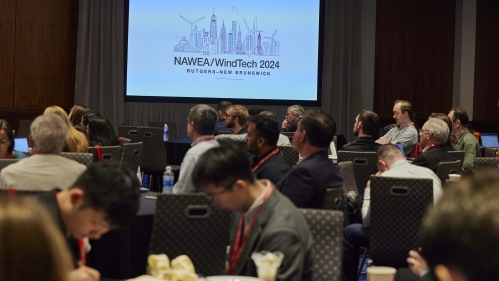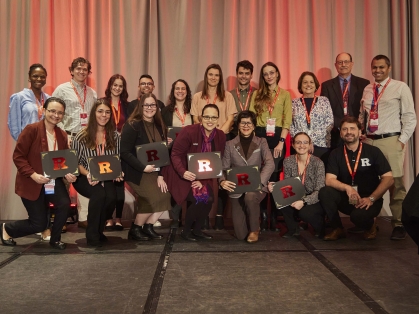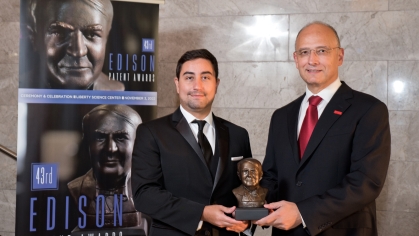Wind Energy Conference Highlights Rutgers’ Role as Hub for Innovation and Collaboration

Global leaders gather for a premier technical conference
Representatives from 18 nations gathered at Rutgers University-New Brunswick for a global conference on wind energy this month that featured leading research on topics ranging from climate change to turbine design.
During the North American Wind Energy Academy/WindTech 2024 Conference held at Rutgers-New Brunswick, researchers attended briefings on the latest in wind energy, as well as a host of hands-on workshops where, in some, they learned and interacted with the software tools used for research.
“You are here because you are the scientists, engineers, policymakers, industry leaders, students and scholars who are leading the future of wind energy,” said Rutgers-New Brunswick Chancellor Francine Conway, welcoming the more than 360 participants.
Conway highlighted state leadership in offshore wind development. Gov. Phil Murphy has set a goal for New Jersey to generate 11 gigawatts of electricity from offshore wind energy by 2040.
In her keynote address, Christine Guhl-Sadovy, the president of the New Jersey Board of Public Utilities, called offshore wind “a pillar of the Murphy administration’s economic and policy agenda.”
Guhl-Sadovy outlined the investments made by the board and other state agencies to capitalize on what she described as “a once-in-a-generation opportunity for offshore wind.”
Tim Sullivan, the chief executive of the New Jersey Economic Development Authority, addressed the economic benefits of offshore wind, emphasizing there is “no bigger net new job creation opportunity.”
Recognizing that “capitalizing on opportunities requires things that haven’t happened yet,” Sullivan said, “I’m counting on science, research and development to make sure we catch up.”
Onur Bilgen, a Rutgers professor of mechanical and aerospace engineering who served as the general chair of the conference, said state and university support for the field has helped drive its advance. The state’s potential as an important center for wind energy research has also drawn attention to the region from stakeholders in the U.S. and in other nations, he said.
Bilgen specifically credited Murphy’s and Rutgers’ commitments to offshore wind as a key factor in the selection of Rutgers-New Brunswick and the New Jersey Academic Alliance for Offshore Wind to host the 2024 conference.

Formed in 2023 to build on longstanding collaborations and multidisciplinary expertise, the New Jersey Academic Alliance for Offshore Wind, which includes Rutgers-New Brunswick and nine other academic institutions throughout the state, provided key organizational support for the conference.
“The success of NAWEA/WindTech 2024 places New Jersey at the center of the global wind energy field, opening pathways to new partners, research and educational grants, investment and other benefits for workforce development,” Bilgen said. “And Rutgers and the members of the New Jersey Academic Alliance for Offshore Wind are preparing the next generation of leaders in wind and renewable energy.”
Bilgen pointed to a number of achievements for the conference, including record number of attendees and abstract submissions. The 2024 gathering also was the most internationally diverse yet, Bilgen said, with participants from Brazil, Canada, China, Denmark, Ethiopia, France, Germany, India, Italy, Japan, Korea, the Netherlands, Spain, Türkiye and the United Kingdom, among other nations. For the first time in the conference’s history, Bilgen added, the National Science Foundation provided a grant to partially fund the Graduate Student Symposium, attended by more than 125 students.
Volunteers from Rutgers and the New Jersey Academic Alliance for Offshore Wind contributed time and professional expertise to coordinate the logistics and details associated with the weeklong event, which spanned all three Rutgers campuses. Fatma Mekik, a Rutgers-New Brunswick student who is pursuing a master’s of science degree in mechanical and aerospace engineering in the Rutgers School of Engineering, described volunteering as an incredible experience. “The opportunity to network with leaders in the field was amazing,” she said.
For Ayhan Yiğit Özel, who also is pursuing a master’s degree in mechanical and aerospace engineering, immersion in presentations on new designs and approaches to wind energy was invaluable. He added that the workshop on OpenFast, an open-source wind turbine simulation software tool, “covered in one day topics that would have taken weeks to learn.”
Participants said they were inspired to learn and do more.
“I encountered research on climate change, mathematical modeling for construction planning, augmented reality to visualize future wind farms and their landscape impacts, and turbine design improvements,” said Leo Calzada, a doctoral degree candidate in the Department of Geography at the Rutgers School of Arts and Sciences. “These are fields I might never have imagined.”
One of three students to win a University Academic Affairs-sponsored award for Best Student Research Poster, Calzada said he was thrilled to note the passion of attendees and a willingness to share experiences and knowledge.
Bilgen cited contributions from the Rutgers Offshore Wind Energy Collaborative, co-led by Margaret Brennan-Tonetta, a senior associate director of the Rutgers New Jersey Agricultural Experiment Station/Economic Development. The collaborative includes Rutgers faculty and staff from all three Rutgers campus’ and over 15 disciplines at the University.
“Collaboration and knowledge-sharing are critical to foster growth of a wind-based economy in New Jersey,” Brennan-Tonetta said.
She credited the New Jersey Economic Development Authority for providing funding through a NJ-EDA University Initiatives grant awarded to Rutgers that escalated the growth of the Collaborative and enabled the development of numerous programs including curriculum development, community outreach and annual symposia.
“With all the advances occurring in science and technology and the enthusiasm of so many in this field — as we have witnessed at this conference — the future for wind energy is bright,” Brennan-Tonetta said. "Researchers and students should be poised for the many opportunities that this new industry will generate."


